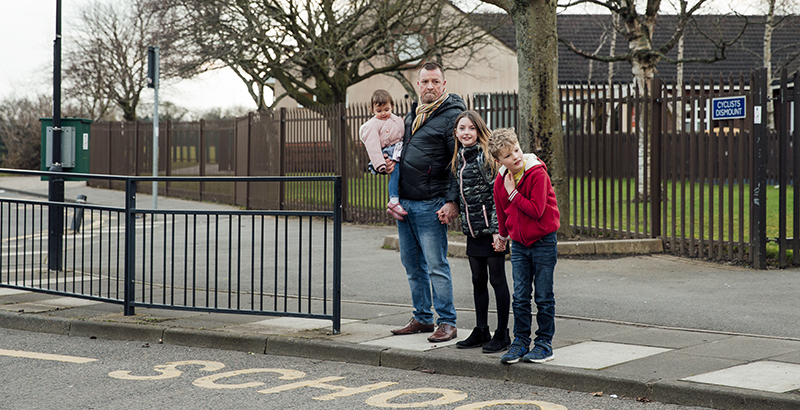Litt: For Families to Help L.A. Schools Improve, District Must Provide Clear Information About Their Kids’ Education, New Report Says

Every day that parents send their children to school represents a tremendous act of faith in their schools and the school system. Parents, however, should not have to act on blind faith. They deserve to know what their children are supposed to be learning and how they are actually doing in school. Unfortunately, in Los Angeles, families do not have consistent access to this important information.
When families can’t get answers about what their children are learning, how they are doing or what the plan is if they have fallen behind, they are denied the opportunity to act as their children’s advocates and to support their schools in implementing coherent instructional programs. In a system where about 60 percent of students do not meet standards in reading and writing, our students and our schools cannot afford for families to be left on the sideline.
At Parent Revolution, we organize public school families so that they have the power to get their children the education they deserve. Whether we are working with an individual family to find the right school for their child or organizing a team of families who want to change things for all students, our work begins with listening to parents.
It’s far too easy for school systems to dismiss or talk over the experience of an individual family. But over the years, we’ve found that families who are frustrated with the lack of educational opportunities for their children don’t have unique, isolated challenges. For every parent who shares his or her story, there are many more with similar experiences. These patterns point to systemic challenges that need to be taken seriously, understood and fixed.
One story we’ve heard in many variations is the family that finds out too late that their child has fallen behind. Sometimes this is a middle school student who reads at an elementary level or a high school student who isn’t on track for college eligibility. Often, it’s an English learner who has always received good report card grades and positive reviews from teachers, but who has not mastered English at a level needed for high school and college.
Families’ experiences must be taken especially seriously in a school system that does not make important data public and that does not use the data it has to identify and tackle its most persistent problems.
In an effort to elevate their experiences, members of the Parent Power Network spent the 2018-19 school year investigating how families in the Los Angeles Unified School District get information about their children’s academic progress, readiness and opportunities. They gathered and analyzed information from the classroom, school, district and state. They looked at websites, the notices sent home in backpacks, report cards and state test score reports. Families also designed and asked a shared set of questions during parent-teacher conferences.
Their findings and recommendations can be found in a new report, “Ready or Not? How Los Angeles Families Get Information About Their Children’s Learning and Academic Progress.” They found that while families get lots of information about their children’s learning from various sources, it is rarely aligned, accessible and actionable so that parents can take steps to improve their children’s opportunities.
The project also revealed several important bright spots. At the school level, most families feel that their teachers and principal are accessible and responsive. in Los Angeles, it seems the days of children translating for their parents are behind us, as every school reflected in the report consistently made translators available for families.
There were signs of early, if scattered, adoption of new technology to engage families with information that gives them the power to monitor their children’s academic progress and intervene if necessary. We also found that teachers, schools, LA Unified and the California Department of Education consistently used state standards to answer the question “What is my child supposed to be learning?” This question had the most consistent information available for families across classrooms and schools, helped largely by the district’s use of a standards-based report card template. Not surprisingly, these report cards are incredibly important for how a family understands their child’s readiness for the future and how they choose to act.
The report found that families still rely primarily on information received directly from teachers and schools. It’s a great sign of strong relationships, but unfortunately, there is far too much inconsistency from classroom to classroom and from school to school.
In some classrooms, families got weekly updates on their children’s academic progress, including a clear sense of what that progress means for their high school and college readiness. But in every case, these updates were provided by an individual teacher taking his or her own initiative, rather than as a consistent practice within and among schools. New technology tools, like LAUSD’s online parent portal, hold promise, but only if they are implemented with clear expectations for how teachers will use them and a comprehensive effort to promote their adoption and regular use by families.
Even in the few areas where families can rely on consistent information from year to year and from classroom to classroom, information from various sources is misaligned and fails to paint an accurate picture of student progress. One prominent example is the misalignment between state test scores in English language arts and math and report card grades. Report card grades are routinely higher than state test scores, and state test scores are rarely discussed with parents by teachers or school staff. This often results in families having an overly confident sense of their child’s academic well-being, which causes them to lose valuable time in intervening in their education. This issue is more pervasive and pronounced for families of English learners.
For those families, especially those whose children enter the school system in middle and high school, there is a disconnect between information presented on a student’s progress at mastering English and how this impacts college readiness. While Los Angeles Unified deserves credit for making sure every family in our network knew the importance of their children being reclassified as fluent English speakers, this information is often presented in isolation from course grades and ELA and math exams.
The greatest level of frustration comes when families know that their children are behind and want to know the plan to get them on track. Parents often ask for academic support by asking for tutoring. Unfortunately, most schools take this request literally and either respond that there is none is available or refer parents to out-of-pocket tutoring companies. This is a huge missed opportunity to listen to what parents are actually asking for, which is to understand what their school and their teacher’s plan is for students who have fallen behind. They want to know what to look for from day to day, how they will know if it’s working for their child and when they can expect to see results.
When I go to the dentist, I want to be told exactly what to expect. It’s the only way I know if the pinch I feel is totally normal or a sign that something has gone wrong. It’s the same thing that I want from a pilot during a flight, especially when we hit turbulence. Schools however, rarely share specific information with families about the instructional program, what they should expect to see and how they’ll know if things are going as they should.
This approach discounts the role of families and ignores the ways that parents can accelerate student learning when they have information about their school’s instructional plan so they can monitor whether it’s happening and whether it’s working. It’s easy to pay lip service to this kind of democratic accountability and local control, but it cannot happen if schools don’t share the type of knowledge that translates into power.
There’s a lot of work to do in Los Angeles. The ELA proficiency level for LAUSD students has gone up by just 1 percentage point each of the past three years. At this pace, it will be another 60 years — generations — until the children of this city’s schools, who are mostly black and Latino and from low-income families, will have access to the opportunities that they deserve.
This is a moral crisis, and the pace of change is too slow. Addressing the scope of the challenge and facing the urgency of the crisis in LAUSD will require a strategy that engages parents as powerful advocates on behalf of their children.
Seth Litt is executive director of Parent Revolution.
Help fund stories like this. Donate now!

;)
